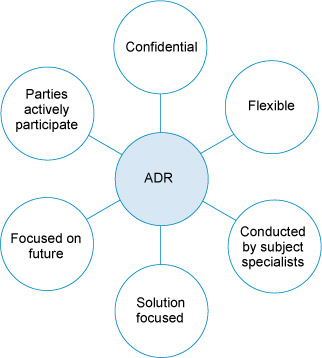4.1 Common features of ADR
In dealing with legal cases that might otherwise have been dealt with by the courts, ADR may be more appropriate because it is less expensive, quicker or less adversarial than a court case, or because it is more focused on finding a resolution rather than apportioning blame or adjudicating which party is right. However, as ADR is outcome-focused, there may at times be a perception that the traditional concepts of ‘justice’ and ‘fairness’ found in the civil court system may be lost in the search for a resolution.
To understand why ADR is a viable alternative to courts and tribunals, it can be useful to consider some of its most common attributes:
The key points highlighted here can be summarised and understood as follows:
- ADR is confidential unless the parties agree otherwise. This means that sessions are held in private and are not reported. This can be particularly useful if a matter is sensitive, for example, for commercial reasons.
- ADR is flexible as it is not typically bound by the same rules in the same way that a court or tribunal would be; however, some forms of ADR, such as arbitration, are subject to rules agreed by the parties.
- ADR is usually conducted by a subject specialist: for example, a housing matter would be dealt with by a housing expert and a commercial matter by a commercial expert. This means that the person dealing with the case has a good understanding not only of the subject but also of the realities and practicalities of that area.
- ADR is focused on resolving the issue and how the parties can address the issue and move on, rather than what has already happened and apportioning fault or blame.
- Parties to ADR can actively participate in the process and mostly get to make the final decision, sometimes facilitated by an intermediary. In contrast, in courts or tribunals, the process is usually conducted by legal professionals on behalf of the parties and the decision is made for the parties with at times only limited involvement or understanding.

